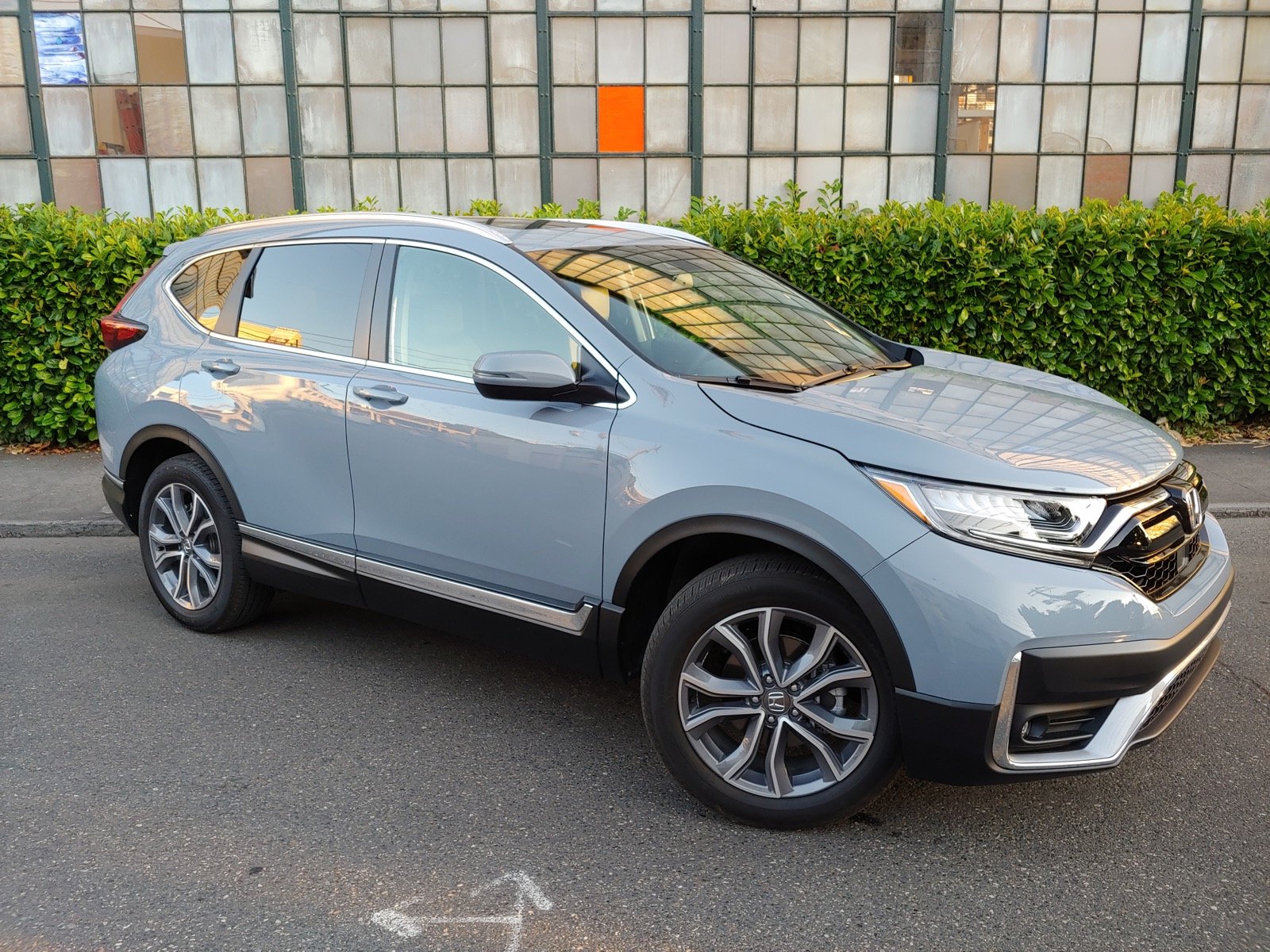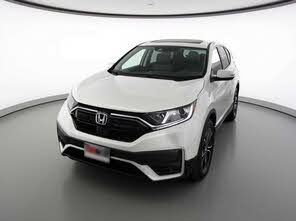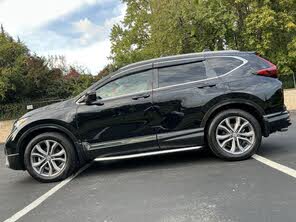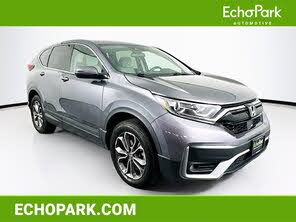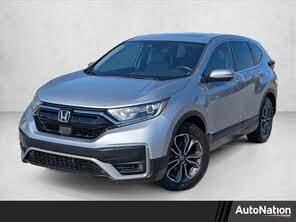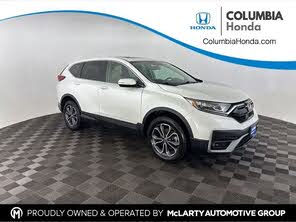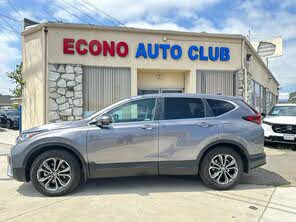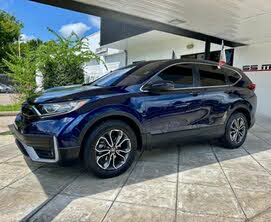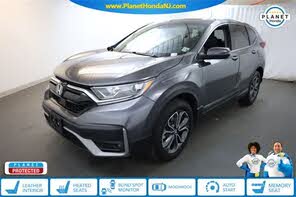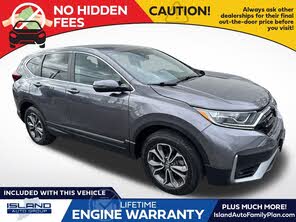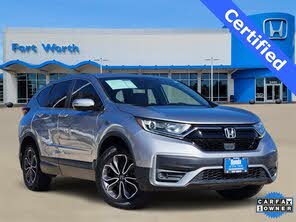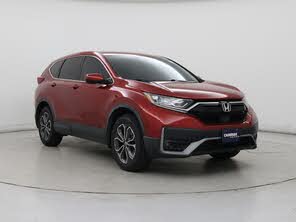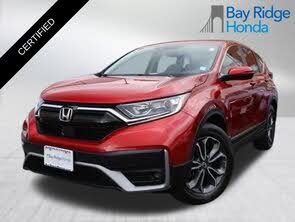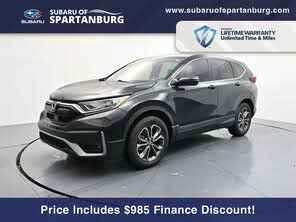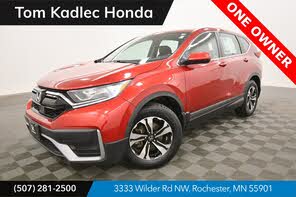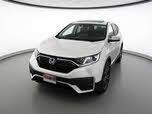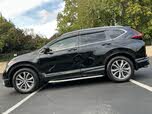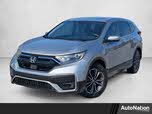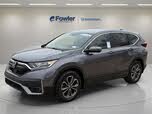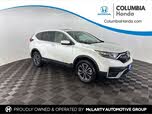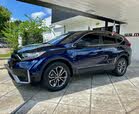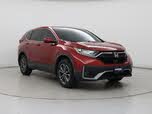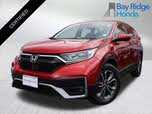2020 Honda CR-V vs 2021 Honda CR-V
Overview | |
MSRP$25,150 | MSRP$25,350 |
Listings1614 | Listings1220 |
Ratings & Reviews | |
User Reviews | User Reviews |
Expert reviews7.5 out of 10 | Expert reviews7.8 out of 10 |
Pros
Cons
| Pros
Cons
|
2020 Honda CR-V Reviews SummaryHonda’s compact SUV has been satisfying buyers for more than two decades, with more than five million CR-V’s sold. Such a legacy means the CR-V has long had its wrinkles smoothed out into a comfortable and capable crossover package that’s only downside may be its sheer inoffensiveness. This year’s model gets engine and safety upgrades, which improve fuel economy and help to make Honda’s bestseller an even better value. | |
2021 Honda CR-V Reviews SummaryEven in a grim year, Honda is selling a staggering number of CR-Vs. The CR-V is the best-selling Honda by far. It’s also the second best-selling compact SUV, just behind the Toyota RAV4. And it's the fifth best-selling vehicle in the U.S., and if you take out all the commercial sales of full-size pickups it’s one of the two best-selling vehicles year in and year out. So it’s hard to argue against the CR-V formula. Honda’s been at this almost as long as crossovers have been a thing, launching the CR-V in 1997—a year after the RAV4 debuted. The funny thing is, aside from sales volume, there’s only one thing the CR-V particularly excels at. Aesthetics are subjective, but it would be hard to argue the CR-V is the best looking vehicle in its class. It’s not the cheapest. It’s not the best equipped, especially at the middle to lower trim levels. It’s not the fastest, nor is it the quietest, or the most fuel efficient. It’s not even the most reliable, showing up nowhere in J.D. Power's Most Reliable list. So what makes it so appealing to American consumers? Let’s see if we can figure that out. | |
No video found | No video found |
Popular Features & Specs | |
Engine1.5L 190 hp I4 | Engine1.5L 190 hp I4 |
Drive TrainFWD | Drive TrainFWD |
Seating Capacity5 | Seating Capacity5 |
Horsepower190 hp @ 5600 rpm | Horsepower190 hp @ 5600 rpm |
MPG City28 | MPG City28 |
MPG Highway34 | MPG Highway34 |
Engine | |
Engine Name1.5L 190 hp I4 | Engine Name1.5L 190 hp I4 |
Torque179 lb-ft @ 2000 rpm | Torque179 lb-ft @ 2000 rpm |
Horsepower190 hp @ 5600 rpm | Horsepower190 hp @ 5600 rpm |
DrivetrainFWD | DrivetrainFWD |
Fuel Economy | |
MPG City28 | MPG City28 |
MPG Highway34 | MPG Highway34 |
Interior | |
Seating Capacity5 | Seating Capacity5 |
Safety | |
Front Crash Overall5 | Front Crash Overall5 |
Side Crash Overall5 | Side Crash Overall5 |
Dimensions & Capacity | |
Cargo Space39.2 cu ft | Cargo Space39.2 cu ft |
Curb Weight3337 lbs | Curb Weight3337 lbs |
Height66.1 in | Height66.1 in |
Length182.1 in | Length182.1 in |
Width73.0 in | Width73.0 in |
Wheelbase104.8 in | Wheelbase104.8 in |
Maximum Payload1358 lbs | Maximum Payload1358 lbs |
Number of doors4 | Number of doors4 |
Maximum Towing Capacity1500 lbs | Maximum Towing Capacity1500 lbs |
Overview | ||
MSRP | $25,150 | $25,350 |
Listings | ||
Ratings & Reviews | ||
User reviews | ||
Expert reviews | 7.5 out of 10Read full review | 7.8 out of 10Read full review |
Pros & cons | Pros
Cons
| Pros
Cons
|
Summary | Honda’s compact SUV has been satisfying buyers for more than two decades, with more than five million CR-V’s sold. Such a legacy means the CR-V has long had its wrinkles smoothed out into a comfortable and capable crossover package that’s only downside may be its sheer inoffensiveness. This year’s model gets engine and safety upgrades, which improve fuel economy and help to make Honda’s bestseller an even better value. | Even in a grim year, Honda is selling a staggering number of CR-Vs. The CR-V is the best-selling Honda by far. It’s also the second best-selling compact SUV, just behind the Toyota RAV4. And it's the fifth best-selling vehicle in the U.S., and if you take out all the commercial sales of full-size pickups it’s one of the two best-selling vehicles year in and year out. So it’s hard to argue against the CR-V formula. Honda’s been at this almost as long as crossovers have been a thing, launching the CR-V in 1997—a year after the RAV4 debuted. The funny thing is, aside from sales volume, there’s only one thing the CR-V particularly excels at. Aesthetics are subjective, but it would be hard to argue the CR-V is the best looking vehicle in its class. It’s not the cheapest. It’s not the best equipped, especially at the middle to lower trim levels. It’s not the fastest, nor is it the quietest, or the most fuel efficient. It’s not even the most reliable, showing up nowhere in J.D. Power's Most Reliable list. So what makes it so appealing to American consumers? Let’s see if we can figure that out. |
Video | No video found | No video found |
Popular Features & Specs | ||
Engine | 1.5L 190 hp I4 | 1.5L 190 hp I4 |
Drive Train | FWD | FWD |
Seating Capacity | 5 | 5 |
Horsepower | 190 hp @ 5600 rpm | 190 hp @ 5600 rpm |
MPG City | 28 | 28 |
MPG Highway | 34 | 34 |
Engine | ||
Engine Name | 1.5L 190 hp I4 | 1.5L 190 hp I4 |
Torque | 179 lb-ft @ 2000 rpm | 179 lb-ft @ 2000 rpm |
Horsepower | 190 hp @ 5600 rpm | 190 hp @ 5600 rpm |
Drivetrain | FWD | FWD |
Fuel Economy | ||
MPG City | 28 | 28 |
MPG Highway | 34 | 34 |
Interior | ||
Seating Capacity | 5 | 5 |
Safety | ||
Front Crash Overall | 5 | 5 |
Side Crash Overall | 5 | 5 |
Dimensions & Capacity | ||
Cargo Space | 39.2 cu ft | 39.2 cu ft |
Curb Weight | 3337 lbs | 3337 lbs |
Height | 66.1 in | 66.1 in |
Length | 182.1 in | 182.1 in |
Width | 73.0 in | 73.0 in |
Wheelbase | 104.8 in | 104.8 in |
Maximum Payload | 1358 lbs | 1358 lbs |
Number of doors | 4 | 4 |
Maximum Towing Capacity | 1500 lbs | 1500 lbs |
The 2020 Honda CR-V represented the fifth generation of Honda’s compact crossover, becoming familiar and beloved since its debut in 2017. Honda designers continued their soft, curvy approach, creating a vehicle with lines more indicative of a station wagon than an SUV, and it maintained a clear family resemblance to Honda’s sedan lineup. The overall look leaned more towards family transportation, emphasizing function over form.
Inside, the picture became more complex. The interior was a blend of textures and materials, with upscale touches like wood-look trim and leather upholstery on pricier models. However, these features clashed with lower-quality plastics, hinting at the vehicle's roots as a commodity car. The 2020 CR-V came in four trims—LX, EX, EX-L, and Touring—with a starting MSRP of $26,270 for the base FWD LX trim. Alloy wheels ranged from 17 inches to 19 inches on different trims, fabric seats on lower trims, and a retractable moonroof on all but the base trim.
In contrast, the 2021 Honda CR-V, despite revisions, maintained a largely similar exterior look. Critics noted that the CR-V’s design mimicked the generic styling common to many crossovers. The vehicle had eight color options, although three were shades of gray, plus black and white. More vibrant colors like Aegean Blue Metallic and Radiant Red Metallic were limited to higher trims, and availability varied by dealer stock.
Internally, the 2021 model provided a modern look, with angular seat designs and sharper details than some competitors. The color and material choices depended on trim levels, with more chrome and wood panels available as you moved up the trim ladder. The Kia Sportage and Hyundai Tucson were seen as having more distinctive styling options, potentially appealing to those for whom vehicle aesthetics were important.

















For the 2020 Honda CR-V, Honda streamlined its engine offerings by making the 1.5-liter turbocharged engine standard across all trims. This engine produced 190 horsepower and 179 pound-feet of torque, paired with a continuously variable transmission (CVT). The CVT, despite some sluggishness, performed well, especially in the Sport drive mode. The CR-V's handling was commendable—nimble and car-like. The vehicle’s light curb weight of just 3,337 pounds for the FWD LX model contributed to its agility and impressive fuel economy: 30 mpg combined for FWD and 29 mpg for AWD models.
The 2021 Honda CR-V continued with the same 1.5-liter turbocharged engine across its trims, excluding hybrids. With 190 horsepower, the CR-V provided smooth and steady acceleration, taking approximately 7.8 seconds to reach 60 mph. This was competitive within its class. Like its predecessor, the 2021 model featured a CVT, which provided a more continuous power delivery but lacked the engagement of conventional transmissions found in rivals like the Kia Sportage, Hyundai Tucson, and Toyota RAV4. The CR-V's MacPherson strut front suspension and multi-link rear suspension ensured decent ride quality and handling.
In the 2020 CR-V, Honda's packaging mastery shone through. The cabin was spacious with ample head- and legroom for both front and rear passengers. Cargo volume was generous, matching the class-leading Volkswagen Tiguan with 75.8 cubic feet of space when the rear seats were folded. Clever storage solutions, like the deep center console and two-position load floor, enhanced the vehicle’s practicality. Door pockets were large, making it easy to stow away and access items.
The 2021 Honda CR-V exceeded its competitors in functionality, offering 102.9 cubic feet of passenger volume—more than the Toyota RAV4. Cargo capacity matched the 2020 figure with 75.8 cubic feet. Depending on the trim, cargo access varied: LX and EX required manual operation, EX-L provided a power tailgate, and Touring included a hands-free power tailgate. Subaru’s approach of standard roof rails, except for the base, was more inclusive compared to Honda's offering.
Technological advancements in the 2020 CR-V were a mixed bag. The base LX trim featured an undersized 5-inch screen with minimal capabilities beyond Bluetooth and Pandora compatibility. Higher trims got a 7-inch touchscreen with Apple CarPlay and Android Auto, though it was still too small compared to the competition, and lacked physical buttons making it cumbersome to use. USB ports were abundant in the EX trim and above, and the Touring trim benefited from a new wireless phone charger.
By 2021, the CR-V made minor tech improvements. The base LX still had a 5-inch screen, but all other trims featured a 7-inch HD touchscreen with better smartphone integration. The audio system's quality improved with trim levels, culminating in a 300-watt system on the Touring trim. The availability of multiple USB charging ports, including powerful 2.5-amp ports in the backseat, added convenience, with a wireless phone charger included in the Touring trim.
In 2020, safety was a strong suit for the CR-V. Honda Sensing was standard across all trims, providing advanced safety features like forward-collision warning, automatic emergency braking, lane-keeping assist, and adaptive cruise control. The NHTSA awarded it five stars, and the IIHS recognized it as a Top Safety Pick, with the caveat that only the Touring trim’s LED headlights scored well in visibility tests.
The 2021 CR-V continued this emphasis on safety, earning both NHTSA’s five-star rating and the IIHS’s Top Safety Pick award. Standard safety features encompassed the multi-angle rearview camera, forward collision warning, automatic emergency braking, lane departure warning, lane-keeping assist, adaptive cruise control, and auto high-beam headlamps. The comprehensive Honda Sensing system across all trims, except blind spot monitoring which was standard from the EX trim, set the CR-V apart from rivals.
CarGurus highlights

According to CarGurus experts, the overall rating for the 2020 Honda CR-V is 7.5 out of 10, while the 2021 Honda CR-V scores 7.8 out of 10. With these scores in mind, the 2021 Honda CR-V slightly edges out its predecessor, making it the recommended choice due to its improved technology, modern interior design, and equally strong safety features. While both models remain excellent options, the newer CR-V offers just that little bit extra, making it a more compelling option for most buyers.
Choose the 2020 Honda CR-V if:
- You prioritize practical and car-like handling with an impressive fuel economy.
- You appreciate the thoughtful interior storage solutions and extensive cargo space.
- You value having advanced safety features standard across all trims without the need for higher-end models.
Choose the 2021 Honda CR-V if:
- You need a vehicle with slightly modernized and sharper interior design details.
- You want comprehensive smartphone integration and enhanced audio system options.
- You prefer a hands-free power tailgate for more convenient cargo access in higher trims.
CarGurus highlights

According to CarGurus experts, the overall rating for the 2020 Honda CR-V is 7.5 out of 10, while the 2021 Honda CR-V scores 7.8 out of 10. With these scores in mind, the 2021 Honda CR-V slightly edges out its predecessor, making it the recommended choice due to its improved technology, modern interior design, and equally strong safety features. While both models remain excellent options, the newer CR-V offers just that little bit extra, making it a more compelling option for most buyers.
Choose the 2020 Honda CR-V if:
Shop Now- You prioritize practical and car-like handling with an impressive fuel economy.
- You appreciate the thoughtful interior storage solutions and extensive cargo space.
- You value having advanced safety features standard across all trims without the need for higher-end models.
Choose the 2021 Honda CR-V if:
Shop Now- You need a vehicle with slightly modernized and sharper interior design details.
- You want comprehensive smartphone integration and enhanced audio system options.
- You prefer a hands-free power tailgate for more convenient cargo access in higher trims.

By: CarGurus + AI
At CarGurus, our team of experienced automotive writers remain at the heart of our content operation, conducting hands-on car tests and writing insightful guides that are backed by years of industry experience. To complement this, we are harnessing AI to make our content offering more diverse and more helpful to shoppers than ever. To achieve this, our AI systems are based exclusively on CarGurus content, ratings and data, so that what we produce is both unique to CarGurus, and uniquely helpful to car shoppers.
